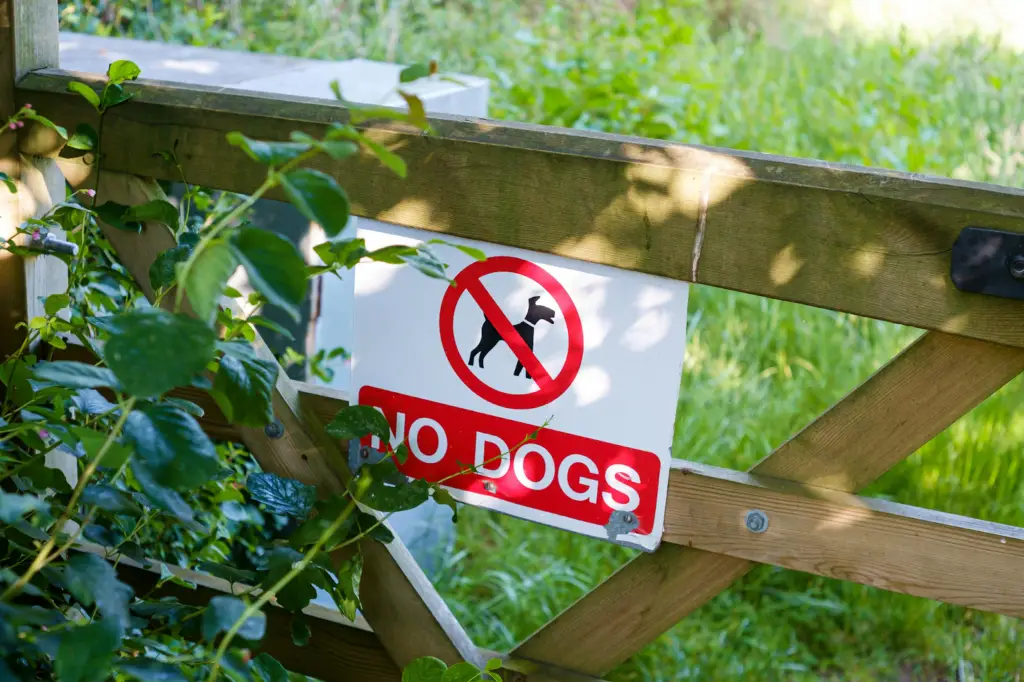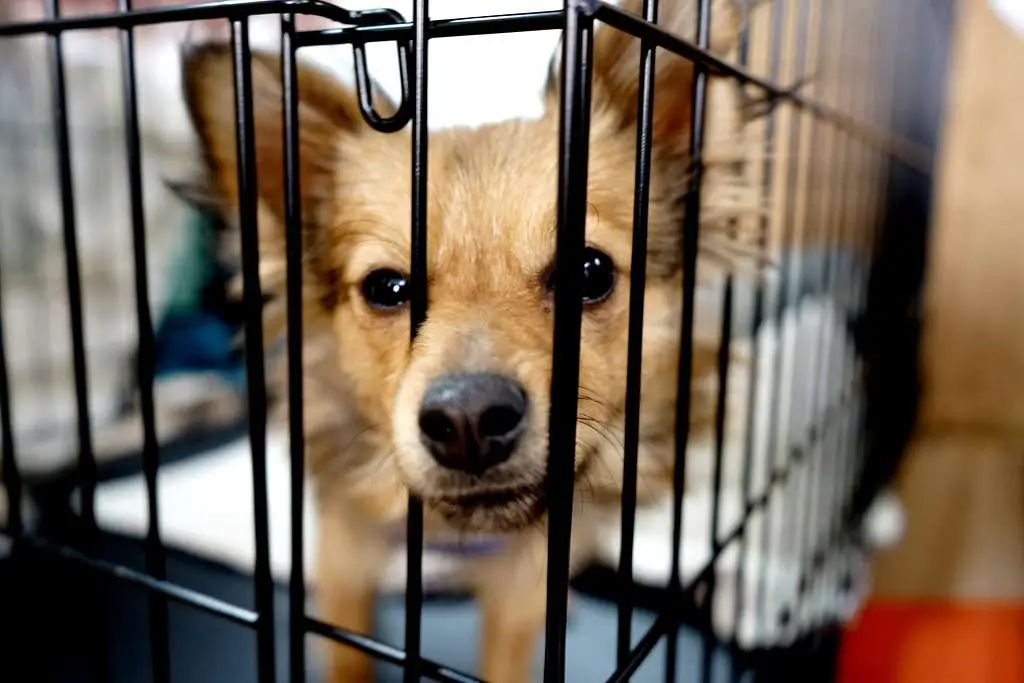1. Not All Hosts Accept Pets

Although Airbnb provides a filter for pet-friendly listings, it’s crucial to remember that not every host will choose to allow pets. According to Houst, even if a listing appears to be pet-friendly, hosts can still decide whether to accept pets based on factors such as breed, size, and temperament. Some hosts might only accept smaller pets, while others may refuse certain breeds due to allergies or past experiences. While Airbnb encourages hosts to clearly communicate their pet policies, some may not fully disclose their preferences in the listing description. This means that even if the listing shows a pet-friendly option, it’s important to carefully read the house rules and directly inquire with the host about any specific pet restrictions.
Sometimes, hosts may allow pets but ask guests to keep them confined to certain areas or outside during certain hours. Pets that are more active or disruptive may also be prohibited by some hosts. It’s always best to clarify these details with the host before booking to avoid surprises upon arrival. If your pet has a history of being destructive or aggressive, it may be difficult to find a host that’s willing to accommodate you. Additionally, some locations may have stricter laws about pets in vacation rentals, so hosts may be more cautious about accepting animals. Always ensure that the host is comfortable with your pet and that they provide you with all the necessary details on what’s expected during your stay. This open communication helps prevent misunderstandings and ensures a smooth experience for both parties.
2. Additional Fees May Apply

Airbnb’s pet policy isn’t always as simple as it seems, particularly when it comes to extra charges for bringing your pet. According to Breezeway, many hosts charge an additional fee for pets, which is typically added to the total cost of the booking. These fees can vary widely depending on the size of your pet, the length of your stay, and the specific rules of the host. Some hosts may charge a one-time fee, while others may charge per night or even per pet. It’s essential to look for any mention of these additional costs in the listing details before booking, but not all hosts will list the pet fees clearly. If the fee isn’t listed in the description, it’s a good idea to reach out to the host for clarification.
In some cases, hosts may not disclose the pet fee until after booking, which can catch you off guard. These fees often cover the cost of extra cleaning or potential damage caused by your pet. Larger pets or those that shed a lot may result in a higher fee due to the additional effort required to clean up after them. Even if the listing doesn’t mention a fee, always ask the host about any hidden charges related to bringing a pet. If you’re traveling with more than one pet, be prepared for the possibility of multiple fees, which can add up quickly. This fee structure can impact your travel budget, so be sure to factor it in when planning your trip.
3. Size and Breed Restrictions

One of the most common and sometimes overlooked aspects of Airbnb’s pet policy is the size and breed restrictions that individual hosts may impose. While Airbnb does not have official rules about pet sizes or breeds, it’s up to each host to set their own guidelines, which means they can have vastly different requirements. Some hosts may only accept small dogs, while others may refuse certain breeds due to safety concerns or allergies. For example, as discussed in this article by Host Tools, some hosts may not allow large or aggressive dog breeds, like Pit Bulls or Rottweilers, due to past incidents or local regulations. Other hosts might not have specific breed restrictions but may still have preferences regarding the pet’s behavior or temperament. If your pet is larger than what is typically considered a small or medium-sized dog, it’s especially important to confirm with the host whether they can accommodate your pet before booking.
Even if a property seems like it would be perfect for your pet, the host may still refuse based on these criteria. In some cases, the host may ask for additional information about your pet, such as whether it’s house-trained or how it behaves around other animals or people. It’s also important to remember that pets with a history of aggression or loud barking may be more difficult to accommodate, as they could disturb neighbors or other guests. If you’re traveling with a pet that may not meet the host’s pet size or breed requirements, it’s essential to be transparent about your pet’s needs. Clear communication helps ensure that you’re able to find a suitable place where your pet will be welcome.
4. Pets Must Be Supervised at All Times

According to Summer, many pet-friendly Airbnb hosts require that pets be supervised at all times during your stay. This is often one of the most strictly enforced rules and is designed to prevent pets from causing damage to the property or disturbing other guests. Hosts may ask that pets never be left alone in the rental for extended periods, as pets can sometimes cause damage, have accidents, or become destructive if unsupervised. For example, some hosts may require that pets remain in a kennel or crate if they are left alone, while others may simply request that pets be kept with you whenever you are on the property. If your pet is prone to barking, chewing, or having accidents indoors, supervision becomes even more important to avoid creating issues for the host or neighbors.
Additionally, if your pet causes damage or messes on the property, you could be charged extra cleaning fees or asked to leave, so keeping a close eye on your pet is crucial. Some hosts may also have specific areas where pets are allowed, such as the yard or specific rooms, and may require that they remain in those areas when unsupervised. It’s important to respect these rules to maintain a good relationship with the host and avoid penalties. For some hosts, supervision may also extend to when pets are outside, requiring pets to be kept on a leash or in a secure area to prevent them from wandering off. If you plan to leave your pet alone in the rental for any period, it’s a good idea to discuss this with the host and make sure they are okay with it. Being proactive and asking about supervision expectations before booking helps prevent misunderstandings during your stay.
5. Cleaning Fees Could Be Higher for Pets

If you’re traveling with a pet, it’s important to be aware that cleaning fees could be higher than usual. According to Hostaway, Airbnb hosts often raise cleaning fees to cover the extra effort required to clean up after pets, especially if your pet sheds a lot or has a tendency to make messes. For example, pet hair can be difficult to remove from furniture, carpets, and bedding, and some pets may have accidents or create other messes that require more extensive cleaning. Even well-behaved pets can cause issues, like scratching furniture or leaving behind paw prints, which can lead to higher cleaning costs. In some cases, the cleaning fee for a pet-friendly listing may be clearly stated in the listing details, while in others, it may not be disclosed until after you’ve booked the property.
If your pet is known for being messy or if you’re staying for an extended period, you can expect the cleaning fee to be on the higher end of the spectrum. Hosts may charge these higher fees to ensure that the property is thoroughly cleaned before the next guest arrives. Sometimes, these fees can add up to a significant portion of the overall cost of your stay, especially if you’re traveling with multiple pets. If you’re on a budget or looking to save, it’s worth considering how these cleaning fees may impact your travel costs. Always check the house rules and reach out to the host for clarification on any pet-related cleaning fees, and make sure you understand exactly what is included in the cost of the booking.
6. No Guaranteed Refund for Pet-Related Issues

One of the risks of traveling with pets on Airbnb is that there’s no guarantee of a refund if something goes wrong with your pet during your stay. While Airbnb’s Guest Refund Policy offers coverage in certain cases, incidents involving pets are generally excluded. This means that if your pet causes damage to the property, disturbs neighbors, or creates other issues, Airbnb may not cover the cost of repairs or provide any compensation. In the event that your pet causes a significant problem, such as chewing up furniture or soiling carpets, the host can ask you to pay for the damage out of pocket. Airbnb typically expects guests and hosts to handle such disputes privately, and the platform doesn’t typically intervene in these cases. Even if you’ve purchased pet insurance, this doesn’t necessarily cover damages caused during your Airbnb stay, which can leave you responsible for any costs.
Some hosts may ask for a security deposit to cover potential damages, but there’s no guarantee that this will be refunded if a pet-related issue arises. If your pet is disruptive or causes a serious issue, the host could cancel your booking entirely, and you may lose your accommodation without recourse. To avoid these situations, it’s important to keep your pet under control and adhere to all house rules. If you’re concerned about potential issues, it’s a good idea to discuss your pet’s behavior with the host and make sure they’re comfortable with your pet staying at their property. Being proactive about potential risks can help mitigate the chances of facing costly charges or losing your booking.
7. Pet-Friendly Listings Are Not Always Ideal for Pets

Just because a listing is labeled “pet-friendly” doesn’t necessarily mean it’s the best place for your pet. Many pet-friendly listings on Airbnb allow pets, but may not offer the kind of amenities that make the stay comfortable for animals. For example, some properties may not have a fenced yard for dogs to roam freely or may not be located in areas with easy access to pet-friendly parks. While the space might be comfortable for humans, pets may not have the right setup to stay safe and entertained. Pets need space to play and exercise, especially active dogs that require regular walks or outdoor time. If you’re traveling with an older pet or one with special needs, you may need additional accommodations, such as easy access to a bed or a quiet area to rest.
Some hosts may provide basic pet amenities, like food and water bowls, but it’s essential to confirm these details in advance, especially if your pet has specific needs. Additionally, multi-unit buildings or shared spaces might not be ideal for pets that are easily startled by noise or other animals. For some pets, a vacation rental that’s too close to other guests or noisy areas could lead to stress or anxiety. Before booking, think about your pet’s habits and whether the property offers enough space and amenities to keep them safe and comfortable during your stay.
8. Unregistered Pets Could Lead to Cancellations

If you bring a pet to your Airbnb stay without registering it with the host beforehand, it could lead to your reservation being canceled. Airbnb’s system encourages guests to disclose their pets when booking, and failing to do so can be seen as a violation of the host’s rules. While some hosts might be okay with last-minute pet disclosures, others may have strict policies about pets, including refusing them outright or charging extra fees. If you show up with an unregistered pet, the host has the right to cancel your reservation and ask you to leave. This can be especially problematic if you arrive at a busy time when finding alternative accommodation for you and your pet is difficult.
Some hosts might allow you to stay but impose additional charges for the unregistered pet or ask you to leave if the pet becomes disruptive. To avoid this, always be upfront about your pet during the booking process and double-check with the host that they are comfortable with your pet’s presence. Disclosing your pet helps ensure that both you and the host are on the same page, and it avoids unnecessary conflicts during your stay. If you’re bringing a pet that might have specific needs or behaviors, it’s even more important to let the host know ahead of time so they can make any necessary accommodations.
9. Pets Are Not Allowed in Certain Locations

Even if a listing is pet-friendly, there are specific locations where pets are strictly prohibited. Some regions or communities may have laws or regulations that limit or completely prohibit pets in vacation rentals. For example, certain vacation spots or tourist destinations may have regulations that forbid pets in rental properties to ensure public health or safety. Additionally, properties in high-rise buildings or multi-unit complexes might have rules that restrict pets, particularly larger or noisier animals that could disturb neighbors. While Airbnb encourages hosts to follow local laws, there may be additional pet restrictions based on the specific area you’re staying in. Hosts in these areas may be more cautious about accepting pets or may have a more limited scope of what types of pets are allowed.
Before booking, it’s important to verify whether the location has any restrictions on pets, especially if you’re traveling to a popular destination with lots of regulations. Some hosts may also have stricter rules about pets in certain neighborhoods or communities with active homeowners associations (HOAs) that prohibit animals. Always check these details with your host to avoid surprises or booking issues. Knowing the area’s pet policies can help you plan better and find more pet-friendly accommodations.
10. Communication with Hosts is Key

One of the most critical steps in ensuring a smooth pet-friendly Airbnb experience is maintaining clear communication with your host. Although Airbnb’s platform allows you to filter for pet-friendly listings, it doesn’t guarantee that the host will accommodate your specific pet or its needs. To avoid misunderstandings or complications, it’s always a good idea to contact the host directly before booking. Discuss any details about your pet, such as its size, breed, temperament, and behavior. If your pet has special needs or requires extra care, be upfront about it so the host can confirm whether the property is a good fit.
Hosts appreciate guests who take the time to communicate openly about their pets and who follow any house rules related to animals. This transparency helps establish trust between you and the host, ensuring that both parties have clear expectations. It also allows the host to let you know if there are any additional pet-related fees or requirements that you might not have seen in the listing. Proper communication before and during your stay can prevent potential conflicts and ensure your pet has a safe and comfortable visit. Ultimately, building a relationship with the host based on mutual respect and understanding can make all the difference in having a positive Airbnb experience with your pet.


